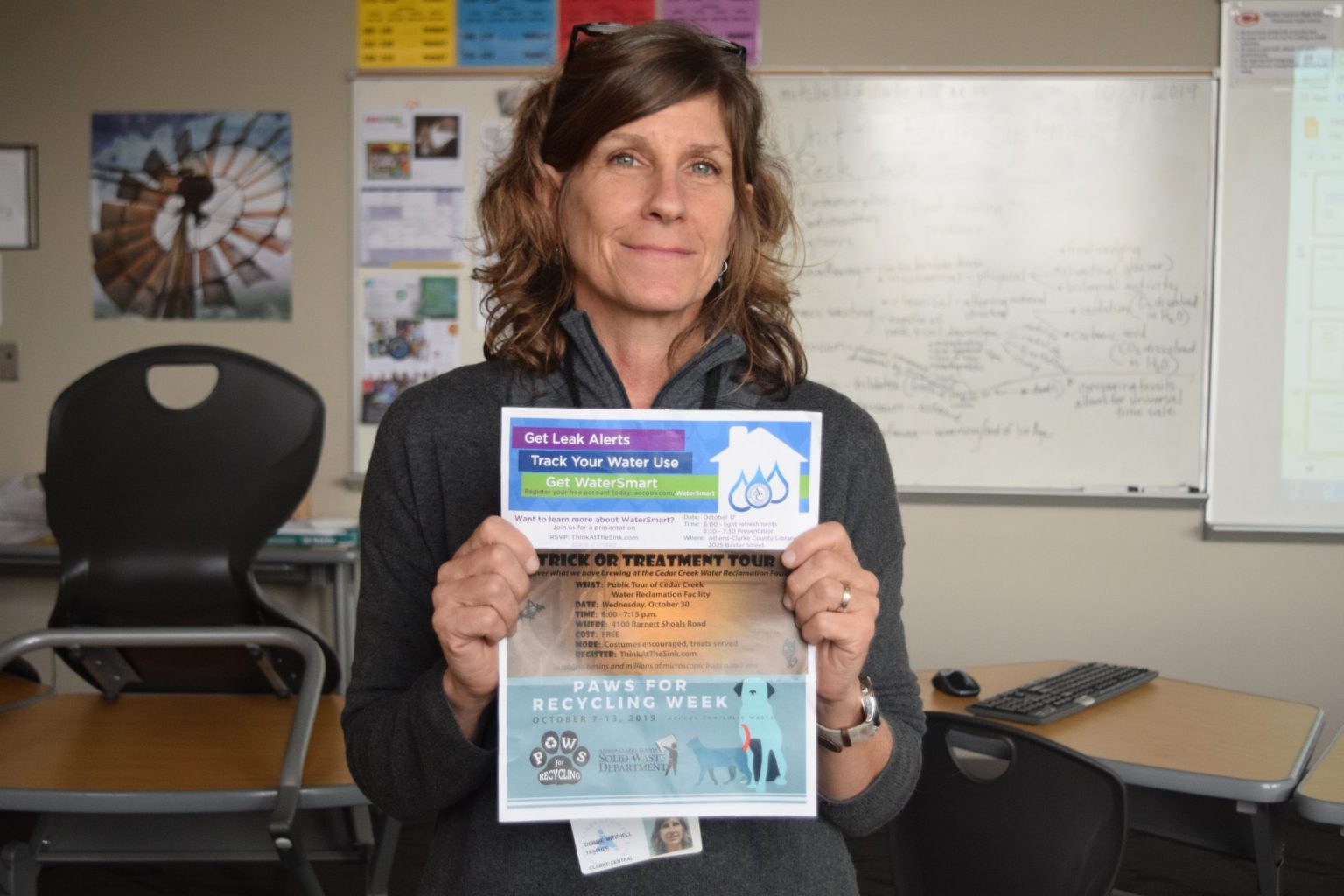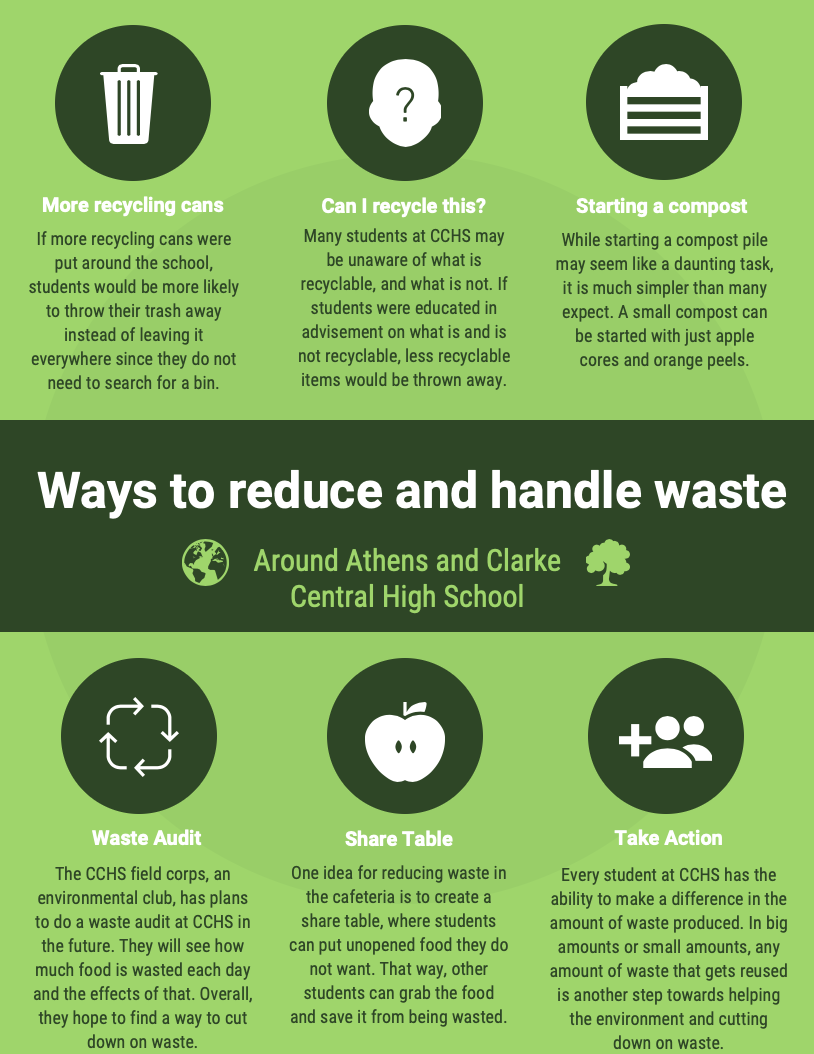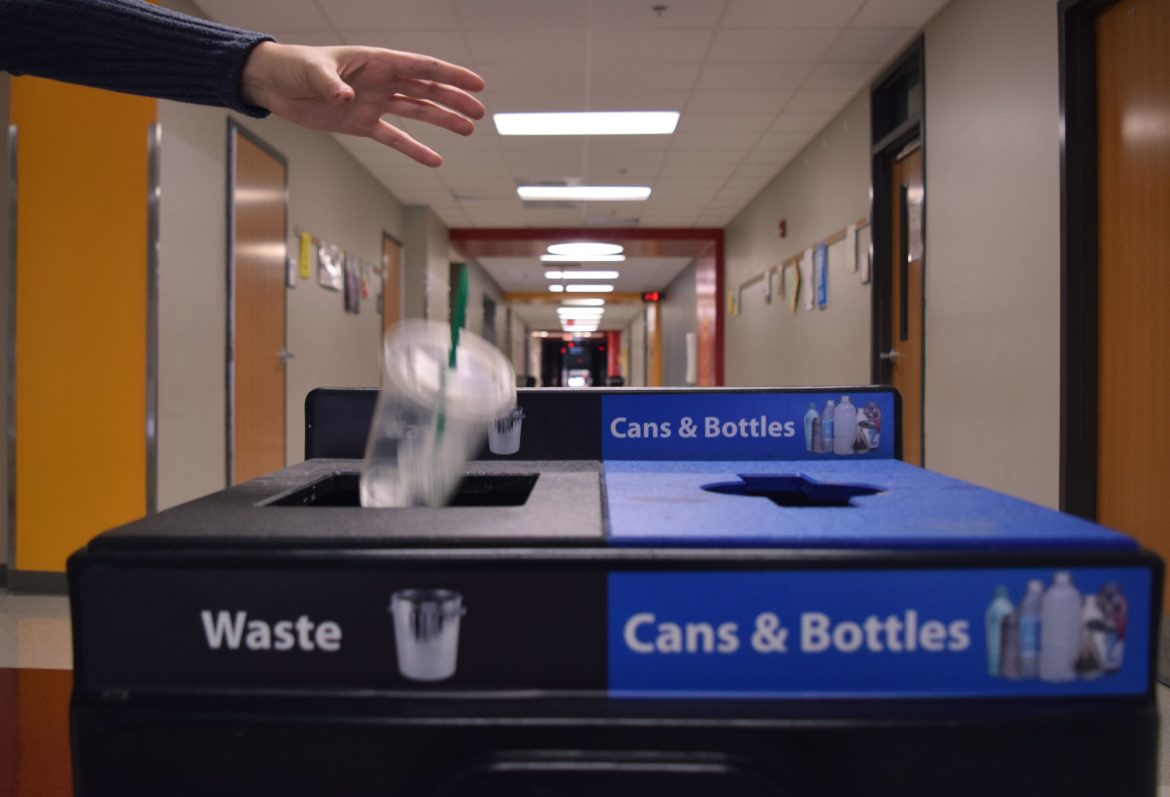A Clarke Central High School student throws a recyclable into the trash bin. CCHS fine arts department teacher Amanda Price observed issues with recycling throughout the school. “I know last year, there was an issue with the actual recycling bins in the hallways not having separate bags for the recyclables. I think that’s been alleviated, I think it would be beneficial to have more of them throughout the school, just for the trash and recycling to help facilitate students actually using them instead of leaving trash or leaving recyclables sitting around just because it’s inconvenient to try to find a place to throw them away or recycle them,” Price said. Photo by Luna Reichert.
Many students, teachers and clubs at Clarke Central High School have raised concerns about how waste is handled at CCHS, specifically in the cafeteria, and what can be done to improve it.
Clarke Central High School has both trash and recycling bins in classrooms, but no recycling opportunities in the cafeteria. However, CCHS feeder schools Clarke Middle School and Burney-Harris Lyons Middle School have successful recycling and compost systems throughout the school.
Amanda Price, CCHS green school co-coordinator and fine arts department teacher believes students would handle recycling and trash better, if the proper systems were put in place.
“I think it would be beneficial to have more (bins) throughout the school, just for the trash and recycling to help facilitate students actually using them instead of leaving trash or leaving recyclables sitting around just because it’s inconvenient to try to find a place to throw them away or recycle them,” Price said.
“At every other school I’ve been at, they’ve had recycling. So, if we can convince three-year-olds to do it, I’m really sure we can convince high schoolers to do it.”
— Ashley Henderson,
CCHS School Nutrition Manager
CCHS School Nutrition Manager Ashley Henderson started working at CCHS in August 2018 and believes CCHS’ recycling program falls short of most other schools.
“At every other school I’ve been at, they’ve had recycling. So, if we can convince three-year-olds to do it, I’m really sure we can convince high schoolers to do it,” Henderson said. “The way we had done it in previous districts, there was just separate garbage cans, and one was for compost, and one was for plastic, and it was divided out like that, and there were signs.”
As a teacher, Price acknowledges some of the potential struggles of recycling properly in the cafeteria.
“I feel like there are a lot of misconceptions about what goes into recycling, and I know even a large part of the population here does not realize if there’s food on recycling materials, then it’s not recyclable, then it contaminates that whole bin of recycling,” Price said.
Debbie Mitchell, a CCHS science department teacher, also sees the issues with food waste in the CCHS cafeteria. However, she believes composting full-scale in the cafeteria may not work.

Clarke Central High School science department teacher Debbie Mitchell poses with an Athens-Clarke County solid waste department poster on Oct. 31. Mitchell believes that CCHS could increase recycling in the school by raising awareness. “I do see a lot of plastic bottles that go into my recycling bin in my classroom. But it’d be great to reinforce that around the school, and if we could just kind of focus on plastic bottles, and then what plastic bottles can be made into when they are recycled,” Mitchell said. Photo by Luna Reichert
“Composting can be really messy. So maybe if we focus just on your apple cores or your orange peels, I think that might be an approach for (composting). So if we simplify things, maybe if we compost fruit, and also get the kitchen scraps from the kitchen staff (it could work),” Mitchell said.
Henderson believes that adding compost bins in the CCHS cafeteria is a realistic goal.
“I think the easiest way, especially if it’s just going to be a Clarke Central thing and not a district thing, is to maybe get with the (person who runs the garden),” Henderson said. “So maybe we could kind of collaborate with them and they could take our waste for the compost.”
CCHS faculty are not the only ones hoping for these changes. CCHS junior Daniel Garcia-Pozo is a member of field corps, an environmental club that has plans for a waste audit.

An infographic pictures various ways that community members and students can reduce waste in Athens and at Clarke Central High School. According to the Georgia Statewide Waste Composition Study, approximately 40 percent of waste thrown away in Georgia every year is recyclable. Graphic by Ireland McCage
“(At the waste audit) they’re going to take the amount of food that people do not eat typically in a day in the cafeteria, and see what the amounts do, see how that affects the accumulation of waste in the school,” Garcia-Pozo said. “Their intended goal is probably to see if we can cut down on that waste.”
According to Mitchell, another possible solution to part of the food waste issue is suggesting students share uneaten food with peers, instead of throwing it away.
“I do see in the cafeteria, some students leave unwanted food that’s untouched in the center of the table. And that’s something we did at Clarke Middle as well. So it’d be neat if that was an understanding among all students that that wasn’t garbage, it was left because they didn’t want it and they wanted to share it,” Mitchell said.
Henderson sees a similar solution to the unused food items left at lunch, since the school is unable to redistribute it outside of the building.
“As far as reducing (the unopened food waste), that would actually be really simple. If we had a share table- so if we could have a table where you could put these items that haven’t been touched that would leave it open to the people that need it (so they) can go and get it,” Henderson said.
CCHS Associate Principal Reginald Thomas believes that students should take the lead on environmental reforms.
“I think we could make more of a concerted effort (on going green), but that should be a student-led charge to kind of make sure that’s happening,” Thomas said. “I think it’d be a good idea (to have recycling in the cafeteria), to have some bins reserved for recyclable items and then we have to teach the students what items are to be recycled.”
Story by Isabella Johnson
Package by Ireland McCage
